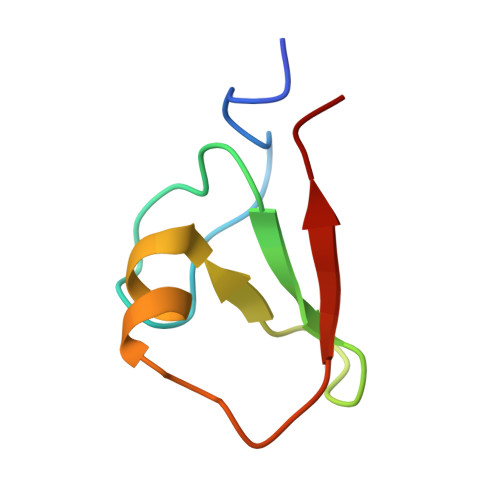ZZ-dependent regulation of p62/SQSTM1 in autophagy.
Zhang, Y., Mun, S.R., Linares, J.F., Ahn, J., Towers, C.G., Ji, C.H., Fitzwalter, B.E., Holden, M.R., Mi, W., Shi, X., Moscat, J., Thorburn, A., Diaz-Meco, M.T., Kwon, Y.T., Kutateladze, T.G.(2018) Nat Commun 9: 4373-4373
- PubMed: 30349045
- DOI: https://doi.org/10.1038/s41467-018-06878-8
- Primary Citation of Related Structures:
6MIU, 6MJ7 - PubMed Abstract:
Autophagic receptor p62 is a critical mediator of cell detoxification, stress response, and metabolic programs and is commonly deregulated in human diseases. The diverse functions of p62 arise from its ability to interact with a large set of ligands, such as arginylated (Nt-R) substrates. Here, we describe the structural mechanism for selective recognition of Nt-R by the ZZ domain of p62 (p62 ZZ ). We show that binding of p62 ZZ to Nt-R substrates stimulates p62 aggregation and macroautophagy and is required for autophagic targeting of p62. p62 is essential for mTORC1 activation in response to arginine, but it is not a direct sensor of free arginine in the mTORC1 pathway. We identified a regulatory linker (RL) region in p62 that binds p62 ZZ in vitro and may modulate p62 function. Our findings shed new light on the mechanistic and functional significance of the major cytosolic adaptor protein p62 in two fundamental signaling pathways.
Organizational Affiliation:
Department of Pharmacology, University of Colorado School of Medicine, Aurora, CO, 80045, USA.





















